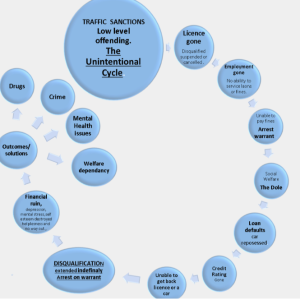18th April 2021
We often hear about the ills of society and in particular the failings of our youth.
We hear a lot less about solutions and almost nothing about what, as a society, we inadvertently contribute to exasperating the problem.
There is however uniform agreement that the most important strategies to help keep our youth on the straight and narrow is education and then employment.
If they do err, then the wisdom is that they should receive a diversion rather than a penalty; but paradoxically that argument is only applied to crime; traffic errors are excluded creating a circle of unintended consequences.
The CAA has argued for this directional change since 2017 but ignored, however, we are confident the new Chief Commissioner with a commitment to youth, crime prevention and community engagement will recognise the imperatives in this case.
We penalise young drivers to an extraordinary level compared to young people that commit even serious crimes like an armed robbery; and then complain that young drivers are turning to drugs and anti-social behaviour, a fairly hypocritical position we would argue. Even most recidivist young drivers never received any diversion when they first came under notice.
A new driver has but five demerit points in their point bank when they start driving. A time when it is perfectly reasonable to expect they will make mistakes. If they do, and they are booked then so be it, but it is the unintended penalty that needs to be urgently addressed.
Apart from being a new driver, most are also in the early stages of a career and the system is weighted heavily against the young people in the trades, where their ability to drive is essential to maintain their employment. In most cases, they cannot carry their tools of trade on public transport and that assumes that public transport services their workplace.
The inevitable outcome is that a three-month licence suspension serves as a penalty not often commensurate with the offence alleged.
Without work, a car loan and living expenses, the dire circumstances faced by our young provide an attraction to either ignore their suspension and drive or turn to crime to service their financial demise.
Sitting around with no work, no money and a car that is about to be repossessed (perhaps destroying any credit rating for future borrowing) provides an environment when even the best kids will be tempted to follow an easy solution, crime.
It will almost inevitably be in the area of drugs as the youth see no escape and look for escapism, drugs; that ticks two boxes (they think) solving the financial crisis and allows an escape from reality on a high.
The legal system should and must be reserved for recidivist offenders, and in the Road Safety space serious breaches.
It is argued by some, who do not understand young people, that if they are aggrieved then the legal system will deal with it. That presupposes that young people are willing to chance their arm by sacrificing more days off work if they even know how the system works and where they should start. Getting a Lawyer is cost-prohibitive and they would not know where to start for legal aid; but here is a better solution.
Victoria Police run a highly effective Cautioning Program for young criminal offenders, and it would only need policy, not legislative changes to include probationary drivers in this scheme.
It is cost-effective, is likely to have very positive outcomes and gives police the opportunity to talk with young people building bridges that often collapse when they are booked.
We can book them today and want their help tomorrow.
Only misguided officials would consider a fine and loss of employment a just penalty for low-level traffic breaches when a great percentage are mistakes rather than deliberate behaviour.
Compliance with the road rules is a lofty ideal but having the community actively supporting this ideal by a more nuanced and targeted approach is likely to succeed with the young, rather than the big stick that is more than likely going to do other damage while trying to land on the target.
The cycle of unintended consequences


